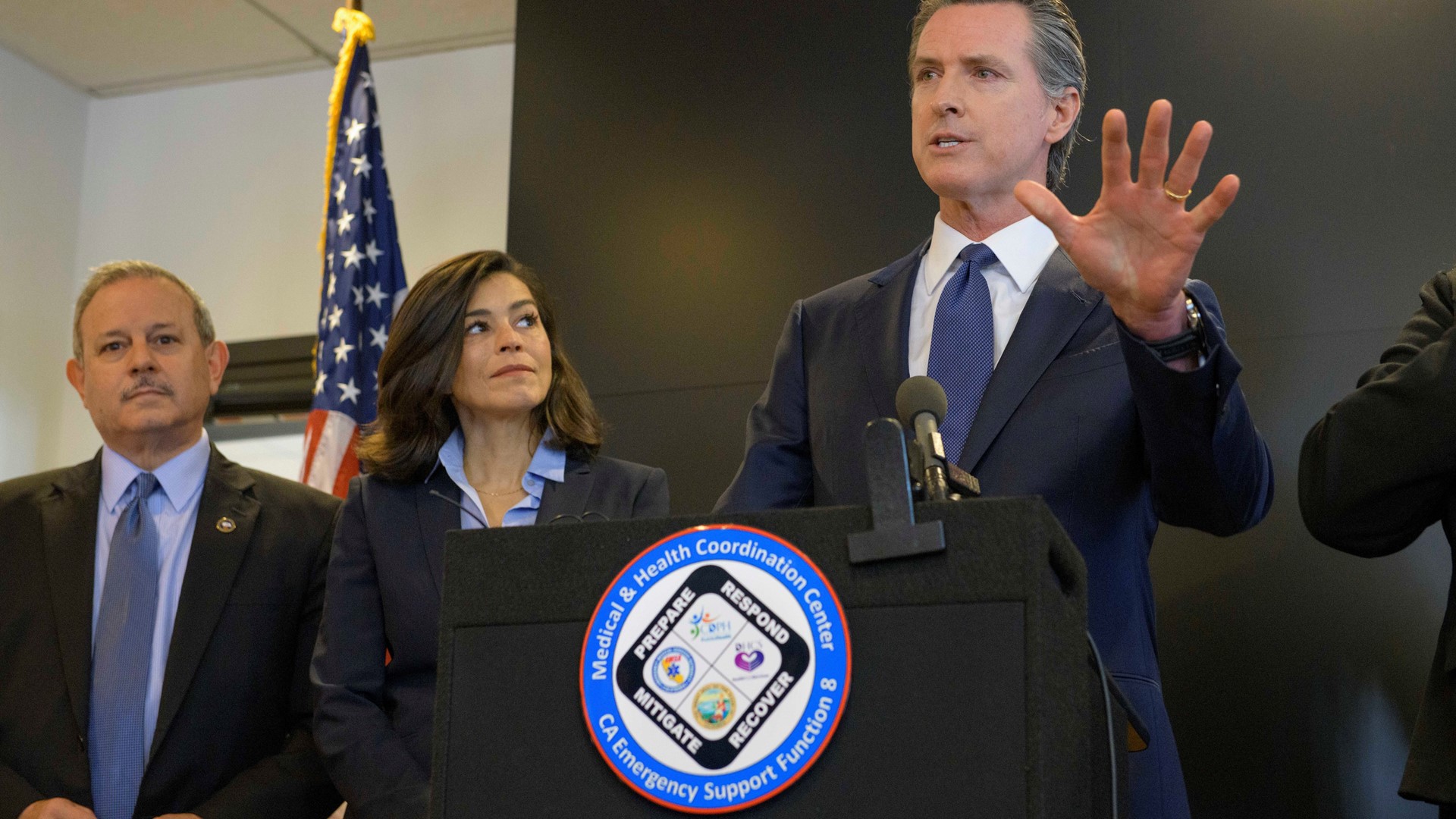SACRAMENTO, Calif. — Gov. Gavin Newsom declared a state of emergency Wednesday in response to California's first coronavirus (COVID-19) death. The elderly man from Rocklin likely caught the virus while on a Grand Princess cruise in February. He died from the disease Wednesday.
So far, 60 people statewide have tested positive for COVID-19, according to the California Department of Public Health. During his remarks Wednesday afternoon, Newsom said his emergency proclamation wasn't an exaggeration.
"This is not something I say hyperbolically, and it shouldn’t be reported as such. It would be incredibly misleading," he said.
Newsom said the proclamation will help advance the state's resources, loosen up the state's regulatory environment and provide clarity and oversight.
"[It will] provide some clarity in terms of jurisdiction and oversight capacity as it relates to the access and utilization of state fairgrounds, state properties and allow us to preempt local land use if indeed we feel that is appropriate," Newsom said during the press conference.
State-owned properties and fairgrounds could be used to assist in preparing for, responding to, mitigating the effects of, or recovering from COVID-19, according to the proclamation.
Newsom said the emergency status will allow the state to access needed medical supplies or other monitoring or suppression efforts with a sense of urgency and without hurdles. It will also allow the state to share data with its network.
"Making sure that all of our jurisdictions — local, regional, state and federal partners — are sharing that same information," Newsom said.
The proclamation also allows EMT-P licensees to transport patients to medical facilities other than acute care hospitals when approved by the California EMS Authority.
"It allows us to access out-of-state talent that lets folks come in with their out-of state licensing and credentials into the state of California and maintain those credentials and licensing status to help aid our efforts," Newsom said.
Newsom also said Californians shouldn't have any anxiety about requesting a test for COVID-19.
"I want to remind people in the state of California... that if you have Medi-Cal, it’s reimbursed," he said. "If you have Medicare, it’s reimbursed. If you have a private health plan, it’s now an essential benefit. It’s reimbursed."
In an announcement Thursday, the Department of Managed Health Care (DMHC) and Newsom directed all commercial and Medi-Cal health plans regulated by DMHC to immediately reduce cost-sharing to zero for all medically necessary screening and testing for COVID-19. The California Department of Insurance issued a similar directive for insurers providing commercial health insurance.
Costs will be waived for emergency room, urgent care or provider office visits when the purpose of the visit is to be screened and tested for COVID-19, according to DMHC. The need for COVID-19 testing is based on medical necessity, a clinical determination made on a case-by-case basis by medical professionals.
Background:
According to the CDC, coronavirus (COVID-19) is a family of viruses that is spreadable from person to person. Coronavirus is believed to have been first detected in a seafood market in Wuhan, China in December 2019. If someone is sick with coronavirus, the symptoms they may show include mild to severe respiratory illness, cough, and difficulty breathing.
Currently, there is no vaccine, however, the CDC suggests the following precautions, along with any other respiratory illness:
- Avoid close contact with people who are sick.
- Avoid touching your eyes, nose, and mouth.
- Stay home when you are sick.
- Cover your cough or sneeze with a tissue, then throw the tissue in the trash.
- Clean and disinfect frequently touched objects and surfaces using a regular household cleaning spray or wipe.
- Wash your hands with soap and water for a minimum of 20 seconds.
The CDC also says facemasks should only be used by people who show symptoms of the virus. If you’re not sick, you do not have to wear a facemask. The CDC says the immediate risk to the U.S. public is low.
FOR NEWS IN YOUR COMMUNITY, DOWNLOAD THE ABC10 APP:
►Stay In the Know! Sign up now for ABC10's Daily Blend Newsletter



